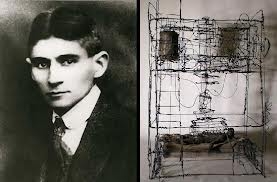A gardener in Papua New Guinea would say this meaning he had pulled a plant’s roots out of the ground. It is German and English mixed with Malay syntax and appropriate here because I am going to focus on the resisting subject in The Penal Colony. This form of Pidgin (Tok Pisin) is a creolization of language, which is a form of resistance against dominant discourse where subjects struggle with the power of the state for control of their bodies. They create a new language to claim space for themselves.
In Kafka’s tale, the nameless characters are products of various power structures that repress individual will. They have no agency because their subjectivity is created by the state. All their actions demonstrate that they are Althusser’s concrete subjects. The state apparatus inscribes the law on their bodies. Just as a harrow cultivates the land, Kafka’s harrow is history subjecting the body to violence in the construction of culture.
However, throughout the story there are signs that the system is flawed and resistance to power is always present.
The Condemned Man
The first sign of resistance to the Old Commandant’s order is the Condemned Man’s insubordination. Rather than begging forgiveness for his misdemeanor, he grabs his superior and shouts, “Throw away that whip or I’ll eat you up.” This mimicry of the master’s aggression reflects the barbarism of the state and demonstrates the individual’s non-compliance with the law. Later, the condemned man dares to bend over the glass of the harrow, and the fact that he is chained and then must be strapped on to the bed of the Apparatus is a clear indication of the individual’s resistance to coercion.
Once in the bed, the Condemned is overcome by nausea and throws up so that the stump of felt can no longer silence him. His vomit flows into the machine.
Later, he uses signs to communicate with the soldier with whom he makes friends. When he sees the officer in the Apparatus, he smiles as he realizes that he will get his revenge. Finally, he tries to leave the island with the Traveler. All of these actions point to an individual’s resistance to power.
The Apparatus
Kafka’s machine of torture is a reflection of the State’s inability to completely control all subjects. Thus, the machine only “seems to do its work uniformly.” It squeaks creating a disturbance that infuriates the Officer who sees that it is still “not working properly.” In fact, the officer unwittingly admits to the failure of the system when he calls the tortured “martyrs.” The transfiguration on their faces brings to mind saints on burning pyres who refuse to give up their faith and just before death experience a transfiguration that only confirms their convictions. The condemned in the penal colony resist even while their sentences are being inscribed down to the very core of their bodies.
The Officer, on the other hand, does not require straps and cannot use the felt stump as he willingly submits to his torture and death. There isn’t even the slightest hum when the Officer is in it, perhaps because he, like Pontius Pilate, cannot wash his hands of his guilt. However, the machine self-destructs because it is torturing one of its own docile subjects. Paradoxically, the state as oppressive power can only function when it is suppressing individual will. In other words, where there is “guilt beyond a doubt” resistance is inevitable. (The imploding machine reminds me of Isaac Asimov’s imploding robots, which are unable to deal with the changeable nature of morality because they lack free will)
The Traveller
The Traveler recognizes the inhumanity that the Apparatus represents. He cannot decipher the language of the diagrams, but he is horrified by the implication of what he sees. He refuses to support the Officer, and although his decision not to stop the machine from killing the Officer points to his own subjectivity cultivated by another oppressive system, he bites his lip and says nothing. Why does Kafka add this detail? The biting of his lip indicates that he is holding something back. He is not completely without a conscience. Something is bubbling just under the surface. The reader is disappointed in his pathetic behaviour, and when he prevents the Soldier and Condemned Man from leaving the island with him, he appears to be a very callous individual. However, I would argue that the glimmer of conscience that keeps threatening to make itself heard is Kafka’s acknowledgement of the resisting voice that we may choose to stifle but that is, nevertheless, always there.
If citizens are products of a culture that controls them, why the need for the Apparatus?
Where there is power there is resistance, which is an expression of individual will.
As my Irish grandfather said to his children when they were not allowed to speak Gaelic and had to use English in school, “Bastardize de language baiy!”
So they would ask, “Verarugoin and vatarudoin?”

